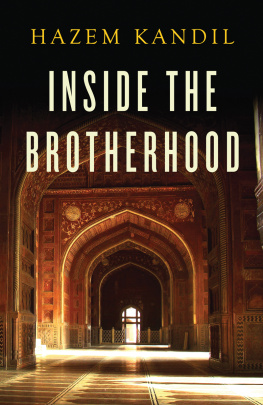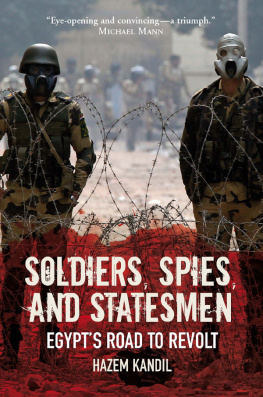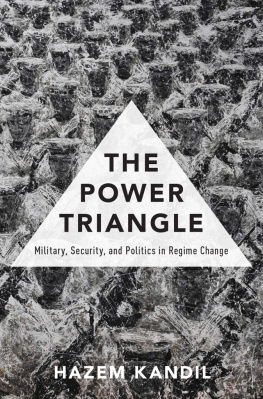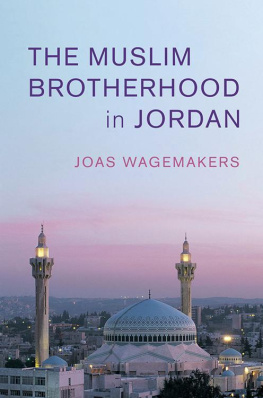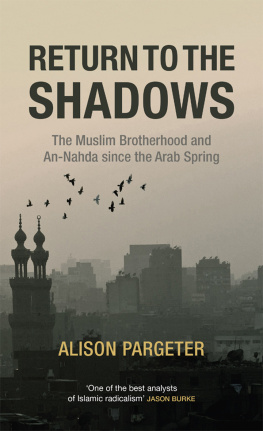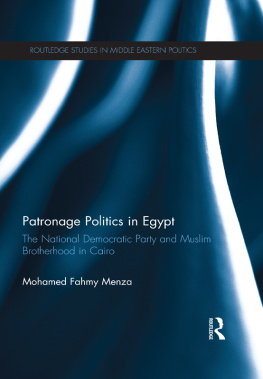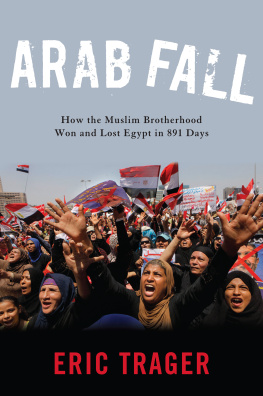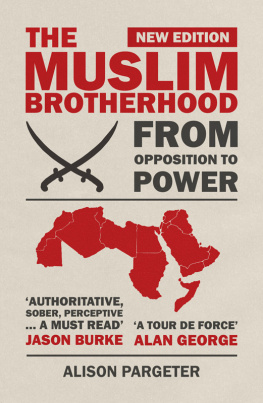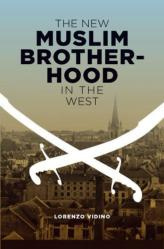
Copyright Hazem Kandil 2015
The right of Hazem Kandil to be identified as Author of this Work has been asserted in accordance with the UK Copyright, Designs and Patents Act 1988.
First published in 2015 by Polity Press
Polity Press
65 Bridge Street
Cambridge CB2 1UR, UK
Polity Press
350 Main Street
Malden, MA 02148, USA
All rights reserved. Except for the quotation of short passages for the purpose of criticism and review, no part of this publication may be reproduced, stored in a retrieval system, or transmitted, in any form or by any means, electronic, mechanical, photocopying, recording or otherwise, without the prior permission of the publisher.
ISBN-13: 978-0-7456-8291-4
ISBN-13: 978-0-7456-8295-2 (epub)
ISBN-13: 978-0-7456-8294-5 (mobi)
A catalogue record for this book is available from the British Library.
Library of Congress Cataloging-in-Publication Data
Kandil, Hazem.
Inside the Brotherhood / Hazem Kandil.
pages cm
Includes bibliographical references.
ISBN 978-0-7456-8291-4 (hardcover) ISBN 0-7456-8291-X (hardcover) 1. Jam'iyat al-Ikhwan al-Muslimin (Egypt) 2. Islamic fundamentalismEgypt. 3. Islamic fundamentalism. I. Title.
BP10.J383K36 2014
320.5570962dc23
2014019107
The publisher has used its best endeavors to ensure that the URLs for external websites referred to in this book are correct and active at the time of going to press. However, the publisher has no responsibility for the websites and can make no guarantee that a site will remain live or that the content is or will remain appropriate.
Every effort has been made to trace all copyright holders, but if any have been inadvertently overlooked the publisher will be pleased to include any necessary credits in any subsequent reprint or edition.
For further information on Polity, visit our website: politybooks.com
To those Brothers who found the strength to climb the walls and look beyond
Support your brother, whether he is the oppressed or the oppressor.
O Prophet of God, support him surely if he is oppressed, but what if he is the oppressor?
Restrain him or prevent his oppression; this is how you support him.
Prophet Muhammad
Introduction
A reputation established over eight decades collapsed in less than eight months. Islamism, an ideology that carved its name from Islam, had always been synonymous with it in the minds of many. And the Egyptian Muslim Brothers, who have invented and embodied this ideology since 1928, had been merely perceived as fervent believers who went beyond practicing religion to propagating and defending it. But a gathering rebellion against the country's first Brotherhood president changed all that. On the eve of the 2013 popular uprising against Muhammad Morsi, Brothers organized preemptive sit-ins in several locations around the country. The biggest crowd camped around Cairo's Rab'a al-Adawiya mosque. For 40 days, unsuspecting Egyptians tuned in (some even strolled in) to witness for themselves what Brothers said and did. It was a rare opportunity to eavesdrop on this exceptionally discreet group. And what the people saw and heard was somewhat different from what they were used to from the normally polished Brothers: political competitors were religiously condemned; images of Prophet Muhammad's epic battles were conjured; biblical stories, from David and Moses to Armageddon, were invoked; claims that Archangel Gabriel prayed at the Islamist campsite were flaunted; and sacred visions were relayed on stage night after night. This was not the vocabulary Brothers typically employed in their public interactions. Almost overnight, many Egyptians panicked. Who were these strangers, they wondered?
Little did they know that many Brothers were equally confused. Popular hostility was certainly frustrating after decades of successful promotion of the Islamist image. But there was more: Brothers were visibly shaken by the absence of divine intervention. In their mind, everything was set in place for their divine empowerment (tamkin); and God would never desert His soldiers. The fact that the sit-in coincided with the holy month of Ramadan, which featured Islam's early victories, was quite suggestive. Brothers held constant vigils, fasting during daytime, and praying from dusk till dawn to make themselves worthy of divine favor. As the political showdown approached, the daughter of the Brotherhood's effective leader was caught screaming on television: God will part the sea for us! Just wait and see! But the sea remained as calm as ever, and the cornered believers were mercilessly slain. Those who saw their campsite laid to waste muttered in shock and denial: why would Heaven forsake us?
This book attempts to answer these two questions: Who are the Muslim Brothers? And what sort of relationship do they believe they have with the divine? My search for an answer began in 2006 with a handful of interviews with leading Islamist figures. Responses were typically longwinded, insubstantial, and ultimately unsatisfactory. Resisting the temptation to abandon the project, I decided to revisit the Islamist literature I had ploughed through years before. This was supplemented by six years of regular attendance at a Brotherhood mosque in California, and hours of audio/video indoctrination materials. But immersing myself in Islamist rhetoric raised more questions than answers.
Then something unexpected happened. A mutual friend asked me to lecture informally to a group of Muslim Brothers on secular ideologies. This was the summer of 2008, and Islamists were concerned that their poor grasp of secular platforms hampered their strategy to unite opposition under their banner. Weekly lectures were organized at a Brother's house (during the months I spent in Cairo) with 30 male attendants on average, from a variety of age groups and backgrounds. We bonded over discussions on the origins of Western ideologies and their history in the Muslim world, and I was allowed over the next five years to observe group members closely in their natural habitat, amongst themselves and their families, rather than in action (teaching, providing welfare, campaigning), as other researchers had done before.
Our relationship was dramatically enhanced by the truly singular experience of revolution. As the 2011 revolt unfolded, I saw different members of my study group resign from the Brotherhood in disillusionment; rise to fame as independent activists; assume posts in the Brotherhood's first political party and presidential team; and sacrifice their lives in horrific street battles. This trying episode encouraged them to open up and inspect their beliefs and actions more than they would have normally done. It was also during this time that a series of tell-all memoirs and published testimonies began to trickle out. Months into Morsi's presidency, it became obvious that the Brotherhood's days in power were numbered. So, in March 2013, I returned to Egypt to conduct interviews and focus group sessions some with members of my original crowd, and others with Brothers and Sisters they knew. I was also granted access to crucial movement documents from their personal archives, such as training manuals for group prefects, the all-important cultivation curriculum, questionnaire samples, internal memos, resignation and prison letters, and daily correspondence. Equally important was the opportunity to witness Brotherhood exchanges first-hand on the street, through social media, and in private meetings during the turbulent summer of 2013. These observations, complemented with dozens of memoirs and unpublished writings, allowed me to define the three-sided process that goes to the heart of any attempt to understand the Brotherhood: how individuals are recruited and socialized; how their social networks are constructed and sustained; and how their governing ideas are formulated and imbued.
Next page
